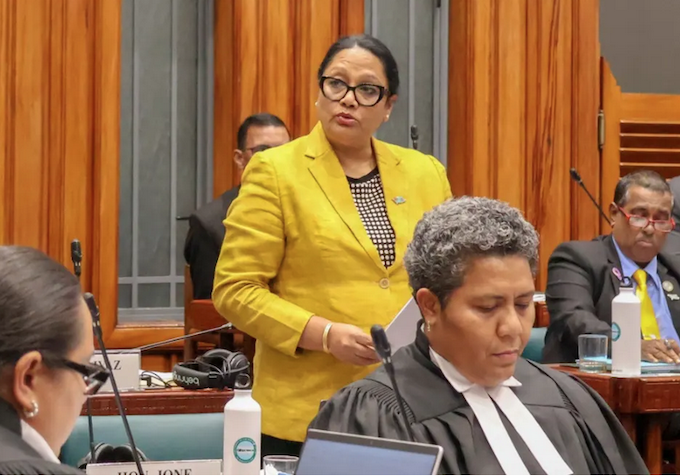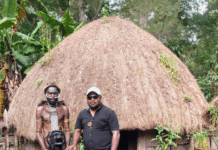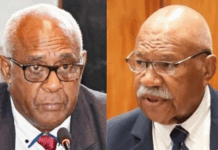
Despite calls from women’s groups urging the government to implement policies to address the underrepresentation of women in politics, the introduction of temporary special measures (TSM) to increase women’s political representation in Fiji remains a distant goal.
This week, leader of the Social Democratic Liberal Party (Sodelpa), Cabinet Minister Aseri Radrodro, and opposition MP Ketal Lal expressed their objection to reserving 30 percent of parliamentary seats for women.
Radrodro, who is also Education Minister, told The Fiji Times that Fijian women were “capable of holding their ground without needing a crutch like TSM to give them a leg up”.
Lal called the special allocation of seats for women in Parliament “tokenistic” and beneficial to “a few selected individuals”, as part of submissions to the Fiji Law Reform Commission and the Electoral Commission of Fiji, which are undertaking a comprehensive review and reform of the Fiji’s electoral framework.
Their sentiment is shared by Prime Minister Sitiveni Rabuka, who said at a Pacific Technical Cooperation Session of the Committee on the Elimination of all forms of Discrimination against Women (CEDAW) in Suva earlier this month, that “putting in women for the sake of mere numbers” is “tokenistic”.
Rabuka said it devalued “the dignity of women at the highest level of national governance.”
“This specific issue makes me wonder at times. As the percentage of women in population is approximately the same as for men, why are women not securing the votes of women? Or more precisely, why aren’t women voting for women?” he said.
Doubled down
The Prime Minister doubled down on his position on the issue when The Fiji Times asked him if it was the right time for Fiji to legislate mandatory seats for women in Parliament as the issue was gaining traction.

“There is no need to legislate it. We do not have a compulsory voting legislation, nor do we yet need a quota-based system.
However, Rabuka’s Assistant Minister for Foreign Affairs and Deputy Speaker Lenora Qereqeretabua holds a different view.
Qereqeretabua, from the National Federation Party, said in January that Parliament needed to look like the people that it represented.
“Women make up half of the world’s population, and yet we are still fighting to ensure that their voices and experiences are not only heard but valued in the spaces where decisions are made,” she told participants at the Exploring Temporary Special Measures for Inclusive Governance in Fiji forum.
She said Fiji needed more women in positions of power.
“Not because women are empirically better leaders, because leadership is not determined by gender, but because it is essential for democracy that our representatives reflect the communities that they serve.”

‘Shameless’ lag
Another member of Rabuka’s coalition government, one of the deputy prime ministers in and a former Sodelpa leader, Viliame Gavoka said in March 2022 that Fiji had “continued to shamelessly lag behind in protecting and promoting women’s rights and their peacebuilding expertise”.
He pledged at the time that if Sodelpa was voted into government, it would “ensure to break barriers and accelerate progress, including setting specific targets and timelines to achieve gender balance in all branches of government and at all levels through temporary special measures such as quotas . . . ”
However, since coming into power in December 2022, Gavoka has not made any advance on his promise, and his party leader Radrodro has made his views known on the issue.

Fijian women’s rights and advocacy groups say that introducing special measures for women is neither discriminatory nor a breach of the 2013 Constitution.
In a joint statement in October last year, six non-government organisations called on the government to enforce provisions for temporary special measures for women in political party representation and ensure that reserved seats are secured for women in all town and city councils and its committees.
“Nationally, it is unacceptable that after three national elections under new electoral laws, there has been a drastic decline in women’s representation from contesting national elections to being elected to parliament,” they said.
“It is clear from our history that cultural, social, economic and political factors have often stood in the way of women’s political empowerment.”
Short-term need
They said temporary special measures may need to be implemented in the short-term to advance women’s equality.
“The term ‘temporary special measures’ is used to describe affirmative action policies and strategies to promote equality and empower women.
“If we are to move towards a society where half the population is reflected in all leadership spaces and opportunities, we must be gender responsive in the approaches we take to achieve gender equality.”
The Fijian Parliament currently has only five (out of 55) women in the House — four in government and one in opposition. In the previous parliamentary term (2018-2022), there were 10 women directly elected to Parliament.
According to the Fiji Country Gender Assessment report, 81 percent of Fijians believe that women are underrepresented in the government, and 72 percent of Fijians believe greater representation of women would be beneficial for the country.
However, the report found that time and energy burden of familial, volunteer responsibilities, patriarchal norms, and power relations as key barriers to women’s participation in the workplace and public life.
Fiji Women’s Rights Movement (FWRM) board member Akanisi Nabalarua believes that despite having strong laws and policies on paper, the implementation is lacking.
Lip service
Nabalarua said successive Fijian governments had often paid lip service to gender equality while failing to make intentional and meaningful progress in women’s representation in decision making spaces, reports fijivillage.com.
Labour Party leader Mahendra Chaudhry said Rabuka’s dismissal of the women’s rights groups’ plea was premature.
Chaudhry, a former prime minister who was deposed in a coup in 2000, said Rabuka should have waited for the Law Reform Commission’s report “before deciding so conclusively on the matter”.
This article is republished under a community partnership agreement with RNZ.










































